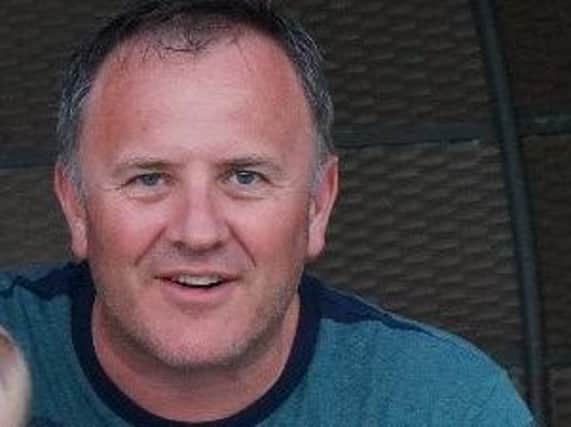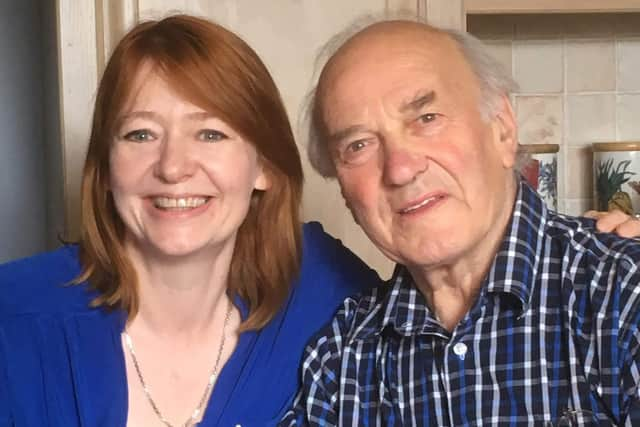The painful reality of losing a loved one during the coronavirus pandemic


There’s a common thread that has run throughout the global experience of coronavirus - and it is of facing the unknown. Life has been engulfed with uncertainty and for those who have sadly lost a loved one during the grips of the pandemic, the reality of saying goodbye has involved navigating a path that has been far from familiar.
For Jo Hammond, who lost her father Bruce in April after he contracted the virus, that has been particularly difficult. “Everything we know about death and the end of life has been taken away from us with Covid,” she says. “The main challenge has been that it’s not what we know. You have an understanding of this is what happens and what people do [after someone dies]. But suddenly, everything about death changed.”
Advertisement
Hide AdAdvertisement
Hide AdFormer pharmacist and popular Rotarian Bruce, 89, had been on a Caribbean cruise with his wife Angela in March and several members on board were diagnosed with Covid-19. When the couple, from Guiseley, returned to the UK, Angela fell ill and was admitted to hospital. After she was discharged, the same happened to Bruce. He passed away at St James’s in Leeds. “We thought we were going to lose mum at one point and then we thought phew, got her home and then dad started with it,” Jo explains.


With visiting times suspended except for in exceptional circumstances to help halt the spread of the virus, she wasn’t able to see her father in hospital. “It’s [normally] very much that if somebody’s ill, they might go until hospital like dad did, you go and see them, there’s family around, you get a call, you squeeze their hand. We had none of that.
“My mum was fortunate in that she was allowed to go and visit when they knew there wasn’t going to be a good outcome, but it was just so hard that we couldn’t go there and be with him.”
Jo and her family opted for a cremation but coronavirus measures meant no one except the funeral director and officiant could enter the crematorium and gatherings outside were restricted to up to 10 family members, with each household socially distanced.
Advertisement
Hide AdAdvertisement
Hide Ad“You could see all these faces popping up as people logged on...and then it was purely focused on his life,” Jo says. “In a crematorium, we would be sat on the front row with our backs to people, focused 100 per cent on the coffin visually...Seeing a coffin is something very emotive and it took that negative emotion away and replaced it with the people from his life - that was our visual for his service. It was very much about who he was, the people, his life and humour.”
Jo believes her “wonderful, kind, crackers” father would have appreciated the novel way of doing things.“He was always into technology and computerised his business at a very early stage, when everyone else still used pen and paper, so he would have loved being one of the first to have a Zoom funeral. It would have also resonated with his irreverent sense of humour, especially because my daughter dressed smartly from the waist up, but then had her unicorn pyjama bottoms on – he’d have found that hilarious.”
Though at first, Jo found it hard to look beyond what was not able to happen, her message to others would be to focus on what can. It is an outlook the family embraced and one shared by Yorkshire-based Full Circle Funerals, who organised Bruce’s service. Founder Sarah Jones says even during this unprecedented period, there are options that allow family and friends to create a meaningful funeral for their loved ones.
“They come into the arrangement knowing that it’s going to be different to what it could have been six months ago but a lot of people think that nothing is possible. So actually once you set out the different options and alternatives to think about and present them with what is possible, people are creating very beautiful funerals and it’s exceeding their expectations.
Advertisement
Hide AdAdvertisement
Hide Ad"That’s the feedback we’re getting...People have felt they have still been able to put something together that was really special, that recognises their loss and that they feel proud of.”
Of course, adapting to what is available is not without its challenges, as Dean of Wakefield Cathedral, The Very Reverend Simon Cowling, reflects. “People are having to make decisions about who will be there [at funerals] and if you have a large family then those decisions are really, really distressing. You simply don’t have the possibility of inviting everybody who you might wish to have at a service to actually come.”
The Dean has been involved in one socially-distanced funeral for a regular Cathedral worshipper. It was held at the city’s crematorium and attended only by the gentleman’s son, who is planning to hold a memorial service for his father at a later date. It was a “strangely moving experience,” the Dean says. “What I felt afterwards was a sense that the journey from life to death had been made much more real somehow because of the starkness of it. It was very dignified but quite stark.”
A big change for him was not going to meet family in person prior to the day. “You can’t actually physically go and sit with them, reflect on the deceased’s life with them, pray with them. It means that level of pastoral comfort which they may rightly expect at that point in their lives just isn’t available and I think that’s really hard.”
Advertisement
Hide AdAdvertisement
Hide AdFor some, dealing with grief has been particularly challenging when distanced from support networks. National charity Cruse Bereavement Care says physical isolation can make feelings of grief and loneliness more intense and harder to process.
A volunteer for the Leeds branch, who requested to be named only as Gill, says in some ways, the period of lockdown has also ‘locked down’ the grieving process. “We are in such unusual times. We can’t get to our loved ones, we can’t have that hug, we can’t go round and see somebody for a cup of tea and say I’m really struggling with the loss of whoever. People can’t do that and it’s one of the main things that’s really stumbling them. It kind of locks the grief down in a way.”
Karen Wilkinson has found that lack of contact with loved ones difficult after losing her husband Daniel in April. Daniel, 51, originally from Otley, was taken ill suddenly in March and was diagnosed with pancreatitis.
He spent five weeks in St James’s Hospital. Karen was originally able to visit, but when lockdown began, the only way she was able to see her husband was through video calls arranged by the ward - and she wishes there had been more. “It absolutely floored me when I couldn’t go visit anymore...[His time in hospital] was a real rollercoaster of emotions and then obviously added to that was the fact I couldn’t see him.”
Advertisement
Hide AdAdvertisement
Hide Ad“I had a video call with him on Good Friday and he was really bright, really alert,” she adds. “He was smiling and he mouthed to me that he loved me and to tell our daughter Millie that he loved her too. That was the last positive thing that I had with him.”
Daniel, who had an accountancy practice in Otley, died in hospital just days later. Karen and their family opted for a burial service at Guiseley Cemetery; it was restricted to ten attendees and limited to 20 minutes long.
“It was really hard,” community staff nurse Karen reflects. “Daniel is from a fairly big family so it was really hard because we obviously had to cut it down to the bare minimum.”
The hearse did a loop of Guiseley allowing Daniel’s friends to turn out and line the streets at a distance to pay their respects. Many wore Leeds United kits in homage to his devotion to the club, whilst ‘marching on together’ adorned the plaque on his coffin and the flowers reflected the team’s colours.
Advertisement
Hide AdAdvertisement
Hide AdA livestream through Facebook allowed Daniel’s friends and families to see the service, which Karen says was “intimate and fit together beautifully”.
The time that has followed has been particularly tough. Karen has been at home with their seven-year-old daughter Millie, trying to manage Daniel’s estate and “dealing with my grief and her grief, with very little support, and not through people not wanting to help”.
“We’re managing it as best we can. Even practical things, doing homeschooling, housework, ironing, washing - you have to crack on and do it because there’s no one else there that can. My daughter’s grief has come out massively in anger and frustration. That’s been really difficult to manage. If she’s having a good day then I can get through the day but if she’s having an awful day then it’s just awful. Many times she’ll be in one bedroom crying and I’ll be in another crying because I’ve just got no fight left in me.”
Karen is grateful that she has been able to see her two older children at a distance, when they have visited and sat on her drive for a chat - but that has been hard too, at times. "If I’m upset, they feel dreadful that they can’t even pass me a tissue or anything like that. It’s been really difficult.”
Advertisement
Hide AdAdvertisement
Hide Ad- Cruse Bereavement Care has a free support helpline on 0808 808 1677.
For more stories from the YP Magazine and The Yorkshire Post features team, visit our Facebook page.
Editor’s note: first and foremost - and rarely have I written down these words with more sincerity - I hope this finds you well.
Almost certainly you are here because you value the quality and the integrity of the journalism produced by The Yorkshire Post’s journalists - almost all of which live alongside you in Yorkshire, spending the wages they earn with Yorkshire businesses - who last year took this title to the industry watchdog’s Most Trusted Newspaper in Britain accolade.
Advertisement
Hide AdAdvertisement
Hide AdAnd that is why I must make an urgent request of you: as advertising revenue declines, your support becomes evermore crucial to the maintenance of the journalistic standards expected of The Yorkshire Post. If you can, safely, please buy a paper or take up a subscription. We want to continue to make you proud of Yorkshire’s National Newspaper but we are going to need your help.
Postal subscription copies can be ordered by calling 0330 4030066 or by emailing [email protected]. Vouchers, to be exchanged at retail sales outlets - our newsagents need you, too - can be subscribed to by contacting subscriptions on 0330 1235950 or by visiting www.localsubsplus.co.uk where you should select The Yorkshire Post from the list of titles available.
If you want to help right now, download our tablet app from the App / Play Stores. Every contribution you make helps to provide this county with the best regional journalism in the country.
Sincerely. Thank you.
James Mitchinson
Editor